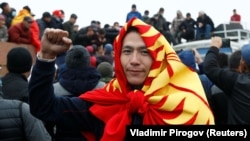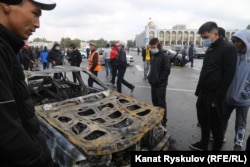Kyrgyz analysts see both dangerous risks and potential opportunities for Kyrgyzstan’s democracy in the October 5-6 protests against the Central Asian country’s October 4 parliamentary elections and the gradual fracturing of the government’s power.
Unlike in Belarus, the election protests in Kyrgyzstan moved rapidly from street demonstrations against suspected election fraud to a harsh police response, protesters’ takeover of government headquarters, and the annulment of the election results.
The rapid string of events brings to mind Kyrgyzstan’s revolutions of 2005 and 2010, albeit without looting, analysts agreed.
By the evening of October 6, Prime Minister Kubatbek Boronov and Parliamentary Speaker Dastan Jumabekov had left office, RFE/RL’s Kyrgyz service and local news outlets reported.
А self-appointed Coordination Council of opposition parties, under Butun Kyrgyzstan (United Kyrgyzstan) leader Adakhan Madumarov, has named Kursan Asanov, an ex-deputy interior minister relieved of his duties in 2019, as interior minister, and has placed opposition Butun Kyrgyzstan parliamentary candidate Omurbek Suvanaliyev in charge of the State Committee for National Security.
Bir Bol (Unite) party candidate Almambet Shykmamatov declared himself prosecutor general and has already confirmed the Central Election Commission’s vote to annul the October 4 election results.
The mayors of the Kyrgyz capital, Bishkek, and the southern regional seat of Osh also have resigned.
Kyrgyz President Sooronbai Jeenbekov, in power since 2017, has not resigned and is believed to be in Bishkek, but some observers believe his time in office is now limited.
His predecessor, imprisoned ex-President Almazbek Atambaev, was released from prison on the night of October 5-6, but is not expected to take any new political role.
Analysts stopped short, however, of calling October 5-6 a revolution.
“It’s probably early to call this anything at all,” said political scientist Emil Juraev. What it clearly amounts to, he added, is “a power crisis.”
Political and strategic communications consultant Azim Azimov agreed that, as in 2005 and 2010, events are “still in process.”
“As a country, as a nation, we’re now trying to define the role of our president, his legitimacy, his will, the role of the parliament, and, also, what is the mandate of civic trust for those parties that didn’t make it into parliament,” Azimov said.
“The revolution has not been completed, there was no overthrow of power because the legitimate authorities still largely remain in their places.”
Political analyst Aida Alymbaeva, however, believes “a certain vacuum” of power exists. “[T]he people do not recognize” what “legitimate” authorities the country has: a president, who has not resigned and is not the subject of an impeachment, alongside a parliament whose term has expired, she noted.
Although he has not resigned and is believed to be still in Bishkek, President Sooronbai Jeenbekov “de facto is not the country’s leader,” agreed Juraev.
The most pressing question in the Kyrgyz capital, however, he said, “is not so much the president’s fate as who should answer for the situation in the country,” including the “pressing questions of every minute that should be resolved now.”
The Central Election Commission has annulled the results of the October 4 parliamentary vote, which gave roughly a quarter of the vote each to two pro-government parties, Birimdik (Unity) and Mekenim Kyrgzystan (My Homeland Kyrgyzstan), but has not yet announced a date for fresh elections. That should occur within the next two weeks.
Right now, responsibility for taking decisions appears to hang between two uncertain poles of power.
At an October 6 emergency session of Kyrgyzstan’s 120-member legislature, or Jogorku Kenesh (Supreme Council), incumbent parliamentary deputies split into two groups.
One group met in the Dostuk Hotel, about a 10-minute walk south of the White House. Local journalists were not allowed into the hotel.
The group named opposition politician Sadyr Japarov as prime minister, AKIpress reported, but since only 30 deputies were present, there was not a quorum to legitimize the choice.
Japarov, a former parliamentary deputy sentenced to 11 1/2 years in prison in 2017 for the kidnapping of a former regional governor during rallies for the nationalization of the Kumtor gold mine, was freed during the night of October 5-October 6.
The hotel band of deputies further elected Myktybek Abdyldaev, a member of the opposition Bir Bol faction, as parliamentary speaker, but, again, without a quorum.
The second group of parliamentarians met behind closed doors in Bishkek’s House of Cinema, but also did not have a quorum, according to 24.kg.
The legislature intends to hold another emergency session on October 7 – presumably, with a quorum -- at which a new parliament speaker and “people-supported new government” will be elected, according to Ata-Meken (Fatherland) leader Janar Akaev, RFE/RL reported.
Quorums have long been a problem for the Kyrgyz legislature, according to a recent investigation by Current Time and RFE/RL’s Kyrgyz Service.
Nonetheless, Azimov believes that, despite the body’s relatively low level of popularity, parliament "should remain a legitimate organ" of power in Kyrgyzstan until fresh elections are held.
In the meantime, serving as a sort of nebulous counterbalance to parliament is the Coordination Council, a group hastily cobbled together on October 6 from representatives of protesting opposition parties Ata-Meken, Bir Bol, Butun (United) Kyrgyzstan, Ordo (The Horde), Reforma (Reform), Respublika (Republic), the Social Democrats, and Zamandash (Contemporary).
Potential for conflict exists within the Coordination Council, believes Alymbaeva. As a self-appointed body, it could not include other political groups in dialogue today, she noted. “And we see that they took many one-sided decisions, which, of course, is cause for new conflicts.”
“It is rather shaky, loose, and has no legal basis,” agreed Juraev. “In any such situation, of course, it cannot have any legal basis.”
Giving a role to younger leaders of the parties that make up the Council would help reinforce public trust in its actions, he said, adding that, right now, many of its members are individuals familiar from the aftermaths of the 2010 and 2005 revolutions.
Against this backdrop of uncertainty, a “need to return urgently to the legitimate rule of law” exists, Juraev said.
In a televised address on October 5, President Jeenbekov urged largely the same, asserting that events that night were an attempt at an illegal coup d’etat.
"I ordered law enforcement organs not to shoot, to avoid bloodshed. Until the last moment, we did our best to keep the situation from escalating.”
Ahead of the vote, Jeenbekov had traveled to Russia, where he told Russian President Vladimir Putin that “various forces, which are against stability, have activated themselves” and oppose “our allied relations and strategic partnership” with Russia.
“Of course, we won’t let them [do] this. Nothing will work for them,” the Kyrgyz leader said, stressing Russia’s importance for his government. Russia maintains a military base at Kant, not far outside of Bishkek.
As yet, however, President Putin does not appear to have commented on events in Kyrygyzstan. The Russian Foreign Ministry, however, released a statement in which it called for a “rapid resolution” of the crisis via negotiations rather than the use of force.
The European Union, similarly, has called on Kyrgyz political groups “ to act within the framework of the constitution and to settle their disagreements peacefully.”
“We look forward to new credible, transparent and inclusive elections, in line with Kyrgyzstan’s international commitments and the democratic rights of its citizens, being organized,” EU foreign affairs spokesperson Peter Stano wrote.
Apart from warning U.S. citizens about the demonstrations in Bishkek and congratulating Kyrgyz voters on their parliamentary elections, the U.S. embassy in Kyrgyzstan does not appear to have commented publicly.
Two analysts blamed President Jeenbekov for the crisis. “Citizens weren’t satisfied by the situation in the country overall,” noted Alymbaeva. Anger at the preliminary election results snowballed with frustration at the role of family clans in government, a high level of corruption, and poor standards of living, she said.
“The election results simply became a trigger for discontent.”
Whether Kyrgyzstan can peacefully find a way out of its political crisis could prove a critical question in the coming days, and an ultimate test of its democratic credentials.
“Whoever would call Kyrgyzstan a model democracy, of course, is exaggerating,” commented Juraev. “Kyrygyzstan is a problematic democracy with serious shortcomings.”
“But nonetheless,” he continued,” when we speak about democracy in Kyrgyzstan, first of all, we have in mind the degree of freedom and the capability of citizens to express their will one way or another. Both yesterday and today, we’re probably seeing another way for this people to express their will.”
-With additional reporting from RFE/RL and AKIpress








